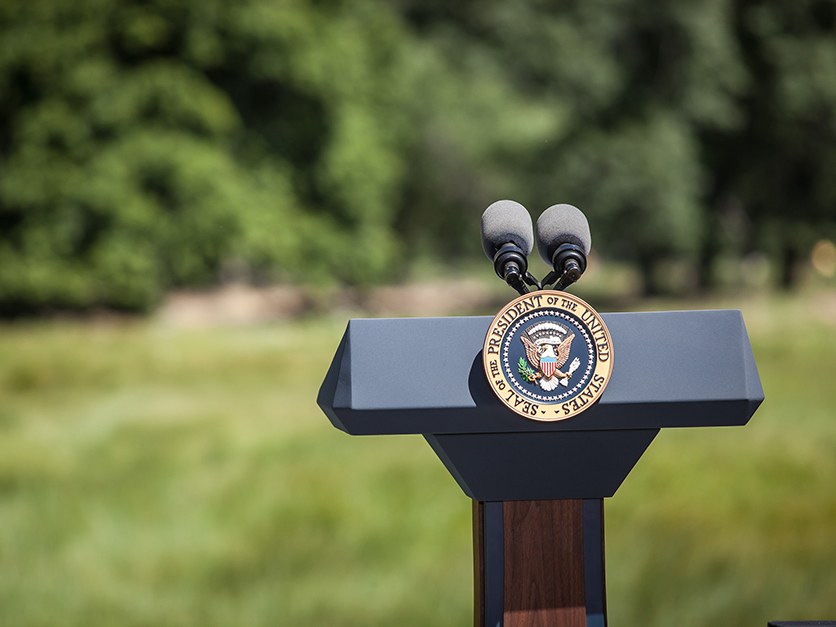In the final debate before the Iowa caucuses, most of the leading Democratic candidates endorsed the U.S.-Mexico-Canada Agreement, citing its potential benefit to farmers.
Some of the candidates also touched on agriculture during some relatively brief exchanges on climate change, arguing producers could help address the problem. But farm issues largely played a minor role in the CNN-Des Moines Register debate, held on Tuesday at Drake University in Iowa’s capital city.
There were no direct questions about President Donald Trump's "phase one" trade agreement with China, which he was scheduled to sign on Wednesday. The Senate is expected to vote before the end of the week to approve the USMCA implementing bill, sending the measure to Trump for his signature.
Vermont Sen. Bernie Sanders and billionaire businessman Tom Steyer, who is running on the single issue of climate change, were alone among the candidates in opposing the USMCA.
“We could do much better than a Trump-led trade deal. This deal, and I think the proponents of it acknowledge, will result in the continuation of the loss of hundreds of thousands of good paying jobs as a result of outsourcing,” Sanders said. He cited the opposition of environmental organizations who have criticized the deal for not addressing climate change.
Steyer said he couldn’t support the agreement while at the same time arguing that climate change was his No. 1 priority. “We cannot put climate in the back seat all the time and say we’re going to sign one more deal,” Steyer said.
But Massachusetts Sen. Elizabeth Warren, who announced her support for USMCA earlier this month, said it was imperative to end the uncertainty about trade policy facing farmers.

Democratic presidential candidate Sen. Elizabeth Warren
“We have farmers here in Iowa who are hurting and they are hurting because of Donald Trump initiated trade wars. … This new trade deal is a modest improvement. Sen. Sanders himself has said so,” Warren said.
South Bend, Ind., Mayor Pete Buttigieg also said the agreement was an improvement over the North American Free Trade Agreement.
Interested in more coverage and insights? Receive a free month of Agri-Pulse or Agri-Pulse West by clicking here.
“It is not perfect, but when you sit down with the people who are most impacted, they share just how much harm has been done to them by things like the trade war and just how much we can benefit American consumers and workers and farmers, by making sure we have the right kind of labor and enforceability that Democrats ensured we got in this USMCA,” he said.
Minnesota Sen. Amy Klobuchar argued the agreement would help the United States counter China. “I think we need a big trading bloc with North America to take on China,” she said.
But she also used the USMCA issue to pivot to a criticism of President Trump’s handling of biofuel policy, recounting having visited a shuttered ethanol plant. “I went to this plant and there was one worker left in this plant,” she said.
On climate change, there was relatively little disagreement between the candidates.
Warren promised to reinstate environmental protections that Trump was rolling back, an apparent reference to the administration’s recent proposal to accelerate environmental reviews required by the National Environmental Policy Act. Among other things, the proposal could speed approvals of federal grazing permits.
But she and other candidates also insisted they wanted to use farmers to help reduce carbon emissions.
“I’ll bring in the farmers. Farmers can be part of the climate solution,” Warren said.
Buttigieg said, “If we get it right, farmers will be a huge part of the solution” to climate change. “We need to reach out to the very people who have sometimes been made to feel that accepting climate science would be a defeat for them, whether we're talking about farmers, or industrial workers in my community, and make clear that we need to enlist the national project to do something.”
Biden made a similar point, saying that he wanted to make U.S. farmers “the first group in the world to get to net zero emissions by paying them for planting and absorbing carbon in their fields.”
For more news, go to www.Agri-Pulse.com.


